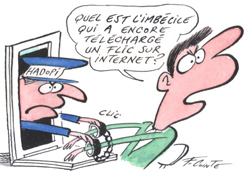Europe's online source of news, data & analysis for professionals involved in packaged media and new delivery technologies

First person convicted under France's anti-piracy, three-strike law
A 39-year-old carpenter who lives in rural eastern France has become the first person ordered to pay a fine (€150) under France's anti-piracy three-strikes law known as Hadopi.
The anti-piracy agency brought to court Alain Prévot for illegally downloading music tracks - Rihanna's songs - and ignoring the three warning letters sent to him. In his (unsuccessful) defence, the man placed the blame on his ex-wife who downloaded the material without his knowledge on a shared Wifi connection.
Prévot told the Parisien newspaper that he does not know how to download. The local police apparently invited him to have his computer "cleaned" by a local IT firm at a cost of €50.
The infringer could have faced a fine of up to €1,500 and had his Internet access cut off for a month, but the prosecutor only requested a fine of €300 in view of his cooperation and displayed naiveté. The fine was eventually reduced to €150.
Hadopi's future is uncertain. Presidential candidate François Hollande had announced plan for the agency's demise. Now President, he went half-way, setting up a consultative commission headed by Pierre Lescure, the respected former Canal + CEO. His reports is expected in Spring 2013.
Hadopi's balance sheet gives ammunition to both sides. For opponents, the very low level of prosecution is proof of the ineffectiveness of the enterprise. For proponents, it is testimony to its essentially educational nature.
Of 3 million IP addresses "identified" by Hadopi, 1.15 million were found to be pirating content and sent a warning letter (the first phase). Of those 1.15 million, 102,854 were given a second warning, and of those, 340 received a third strike. If the third strike is ignored, Hadopi can take legal action, and to date, only 14 offenders have had a case filed with a French court as a result of Hadopi. Prévot is the first to be successfully prosecuted.
The number of users that follow up with Hadopi when they've been sent a warning letter also suggests that the system works - if the goal is only to educate users about copyright. Six percent of people who received an initial letter from Hadopi contacted the agency for more information or to discuss their case, but that number rises to 24% after the second contact is made, and increases to 75% for third-time offenders.
Story filed 03.10.12




















